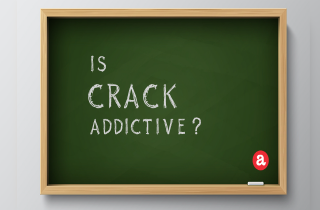Yes, crack is highly addictive. In fact, getting addicted to crack cocaine is an expected outcome of long term use and is based on how crack works. Specifically, when crack is smoked a lot over time, the brain changes its neurological pathways to accommodate for the presence of cocaine.
Here, we review what you need to know if you think you’re an crack addict. We answer questions about what makes crack addictive and how you can know if you’ve become addicted to crack. Afterward, we invite your questions about the addictive potential of crack i the comments section at the end.
What is crack used for?
Crack is the free base form of cocaine. It comes in rock form in various colors. Crack is stronger than cocaine because it is in its more pure form. Plus, the route of delivery (crack is delivered to the brain by smoking it) ensures a more intense, quicker high. While cocaine was once used to treat pain and anxiety, any use of cocaine is now illegal. So crack is used recreationally, heated and smoked for the intense feeling of pleasure it produces. People abuse crack cocaine because of the added energy, mental clarity and sense of well-being that it gives. Others mix crack with other substances, such as mixing alcohol with crack. While tempting, this practice can cause the body to shut down.
What is crack made of?
Crack is considered a benzoylmethylecgonine type of drug and is classified as a stimulant. Stimulants increase mental alertness. Think of it as an intense caffeine high. Once the cocaine is extracted from the coca plant it is then heated and mixed with other substances such as baking soda, ketamine, etc. and then solidified into rocks. In fact, there is not telling what other potential substances are mixed in with crack. This makes the drug cheaper and easier to distribute. Further, crack cocaine has a low melting point so when a rock is heated, it is liquefied and smoked to create the high.
How addictive is crack?
Crack is extremely addictive. Crack disrupts the absorption of dopamine in the system. It effects the distribution of serotonin levels and can permanently alter your brain chemistry, making it difficult to feel normal pleasure. Like the powdered form of cocaine, crack is also a schedule II drug as determined by the Controlled Substances Act of 1970. Schedule II drugs have a high potential for abuse and addiction, which can lead to severe psychological and physical dependence.
How do you get addicted to crack?
Crack has the powerful potential to get you addicted from the start. In fact, You can get addicted to crack cocaine after trying crack a few times. But in general, the more you take crack the more potential for developing an addiction. Additionally, the psychological need to escape can result in the earlier onset ofcrack addiction. And because there is no telling what other substances are in a rock of crack, the potential for other kinds of drug addiction are also present.
Crack dependence vs. addiction
Physical dependence on crack often occurs at the same time as crack addiction. But dependence is not necessarily the same as addiction. Everyone has a different response and reactions to crack. Some people can be physically dependent on crack without being addicted to it. Though this is more of a rare experience than not, during conditions of drugdependence you will experience withdrawal symptoms when the drug is removed without the manifestation ofpsychological symptoms of addiction. However, crack is both physically and psychosocially addictive. This combination of dependence and addiction make is it extremely difficult to seek out a drug free life. Seeking proper support can help you stop dependence on crack and address the underlying psycho-emotional need for smoking crack.
Signs of Crack addiction
Crack addiction involves intense cravings for the crack and the feeling that you can’t go without it. In other words, you may be addicted to Crack if you need to take crack to deal with normal stresses in daily life. Other signs of crack addiction include:
- Chasing after the same intense high of your first hit
- Drug seeking behavior
- Giving up family or friends in order to get high
- Mixing crack with other substances to obtain the same high
- Negative consequences because of your drug abuse
Crack addiction potential questions
Do you still have questions about the addiction potential of crack? Please leave your questions, comments or feedback here. We are happy to help answer your questions personally and promptly. And if we do not know the answer to your particular crack question, we will refer you to someone who does.









Related Posts